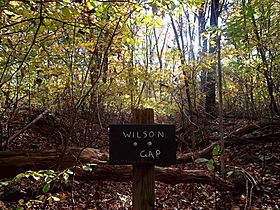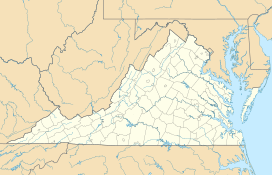Wilson Gap facts for kids
Quick facts for kids Wilson Gap |
|
|---|---|
| Gregory's Gap | |

Sign for Wilson Gap on the Appalachian Trail
|
|
| Elevation | 1,444 ft (440 m) |
| Location | Loudoun County, Virginia / Jefferson County, West Virginia, United States |
| Range | Blue Ridge Mountains Appalachian Mountains |
| Coordinates | 39°10′20″N 77°48′22″W / 39.1723261°N 77.8061055°W |
Wilson Gap, also known as Gregory's Gap, is a special kind of mountain pass called a wind gap. It is located in the Blue Ridge Mountains. This gap sits right on the border between Loudoun County, Virginia, and Jefferson County, West Virginia.
A wind gap is like a low spot or a "notch" in a mountain range. It was likely carved out by an ancient river that has since changed its course. Today, the famous Appalachian Trail crosses right through Wilson Gap, making it a known spot for hikers.
What is a Wind Gap?
A wind gap is a valley or pass in a mountain ridge that was once formed by a river. Over a very long time, the river might have changed its path or dried up. When this happens, it leaves behind a low, empty space in the mountains.
This space is called a "wind gap" because wind often blows through it. Wilson Gap is a great example of how nature can shape the land over thousands of years.
A Path Through the Mountains
Wilson Gap is about 1,444 feet (440 m) high. For many years, it was an important pathway for people and goods. It connected the town of Round Hill in western Loudoun County to other areas.
Round Hill was once the end point for the Washington and Old Dominion Railroad. This railroad helped people travel and move things. From Round Hill, people could use Wilson Gap Road to reach resort towns like Shannondale and Mountain Mission in Jefferson County.
History of the Gap
The resort towns that Wilson Gap Road led to were popular places for vacations. However, during the Great Depression in the 1930s, many businesses struggled. These resorts eventually closed down because of the tough economic times.
By the start of World War II, the upper parts of Wilson Gap Road were no longer kept up. It became too difficult for cars to drive on. Even though it's not a public road anymore, hikers can still find parts of the old road bed today. It's like a hidden path through history!
 | Bayard Rustin |
 | Jeannette Carter |
 | Jeremiah A. Brown |


